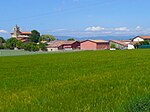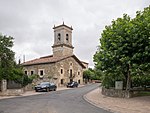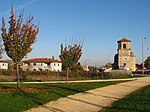CD Aurrerá de Vitoria
1935 establishments in SpainAssociation football clubs established in 1935Football clubs in the Basque Country (autonomous community)Futsal clubs in SpainMulti-sport clubs in Spain ... and 2 more
Roller hockey clubs in SpainSport in Vitoria-Gasteiz
Club Deportivo Aurrerá de Vitoria is a Spanish sports club based in Vitoria-Gasteiz, Álava, in the autonomous community of the Basque Country. Founded in 1935 it currently plays in Tercera División – Group 4, holding home matches at Estadio Olaranbe, with a 4,000-seat capacity. It is a partner club of the local professional team Deportivo Alavés. Aurrera's women's team competes in Segunda División. In addition to the football team, the club has sections of roller hockey, futsal, athletics, archery and inline speed skating.
Excerpt from the Wikipedia article CD Aurrerá de Vitoria (License: CC BY-SA 3.0, Authors).CD Aurrerá de Vitoria
A-2130, Vitoria-Gasteiz
Geographical coordinates (GPS) Address Nearby Places Show on map
Geographical coordinates (GPS)
| Latitude | Longitude |
|---|---|
| N 42.826916 ° | E -2.645371 ° |
Address
Olaranbe
A-2130
01194 Vitoria-Gasteiz
Autonomous Community of the Basque Country, Spain
Open on Google Maps








